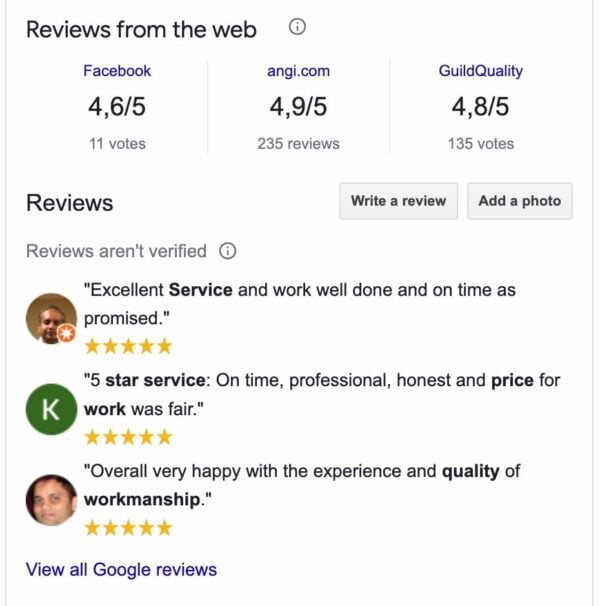popular businesses tend to serve more customers than less popular ones.
ll other factors being equal, popular businesses tend to serve more customers than less popular ones. But remember, Google can only “see” what’s represented online. So if your customers leave reviews of your business at a higher rate than your competitors’ customers, your business will appear more popular and stand a good chance at outranking the competition.
Content
The area in which Google’s algorithm has arguably improved the most over the past years is semantic analysis and neural language processing. One of the earliest datasets on which Google trained its semantic algorithm was local business reviews.
So not only is Google looking at the number of reviews when assessing the popularity of local businesses, it’s looking at what people are saying about local businesses in those reviews. For example, doctors whose patients frequently mention a particular treatment in their reviews will likely rank better in searches for that treatment. Contractors whose customers say the kind of projects they execute, such as “kitchen remodel,” are likely to rank better for searches for those kinds of projects.
The content of your customers’ reviews isn’t necessarily something you can control. But prompting your customers to think about particular questions as they write their reviews (“What service did we perform for you?” e.g.) can help improve the effectiveness of those reviews concerning your rankings.
Diversity
A common misconception is that Google does not use third-party reviews to rank local results. This could not be further from the truth. In some cases, reviews on third-party sites can improve your rankings even more than comparable reviews left directly at Google. It’s not only a best practice but also essential to earn reviews from your customers on some sites beyond Google.
Star / numerical rating
Generally speaking, Google’s algorithm seems to value volume and sentiment much more strongly than the star rating that customers leave for a business. With nearly 75% of reviews being three stars or above (even on Yelp!), it’s not particularly useful for Google to split hairs between a 4.2 and a 4.4-star business, for example.
Where rating may play a larger role is in consumer choice. According to BrightLocal, a majority of consumers see the rating as the most important review factor in choosing a business.
The reviewer
Google’s review spam filter leaves much to be desired. There is, however, some evidence to suggest that the reviewer’s account may positively influence how much weight his or her review carries. In much the same way Yelp Elite reviews carry extra weight in Yelp’s algorithm, reviews from members of the Local Guides Program likely carry extra weight in Google’s.
Velocity
The velocity or frequency customers leave reviews may also impact a business’s rankings. Older reviews might be seen as no longer relevant. While Google’s “review expiration date” is longer than three months, especially in less-frequently-reviewed industries like DUI law or addiction treatment, businesses with a steady stream of new reviews will likely outrank those with a stale review profile.
Where to get reviews
Don’t focus your review acquisition efforts solely on Google. Reviews on prominent sites like Yelp have been proven to single-handedly increase rankings for businesses in smaller markets with limited competition.
As with citations, you want to have reviews on the sites where Google expects popular businesses to have reviews. The only difference between the sites where you should acquire citations vs. the sites where you should acquire reviews is that data aggregators don’t offer reviews as a feature.

Consumer directories
You should do your best to acquire customer reviews on Facebook and Yelp. These two platforms are used to research local businesses by millions of consumers monthly. Yelp syndicates its reviews to Apple Maps. This way, even more consumers will read them. And, of course, Facebook is Facebook — although slowly losing favor, it’s still an important platform for many.
Industry-specific and local reviews
Beyond these two giants, you should look at the sites that show up in Knowledge Panels for your competitors. Also, look at other high-ranking businesses similar to yours in different geographic markets.
Sites like the ones listed in the ‘Reviews from the web’ sections of Knowledge Panels likely have direct relationships with Google to feed them reviews. Also, take a look at the review sites that show up for searches matching the pattern:
Comments
Post a Comment